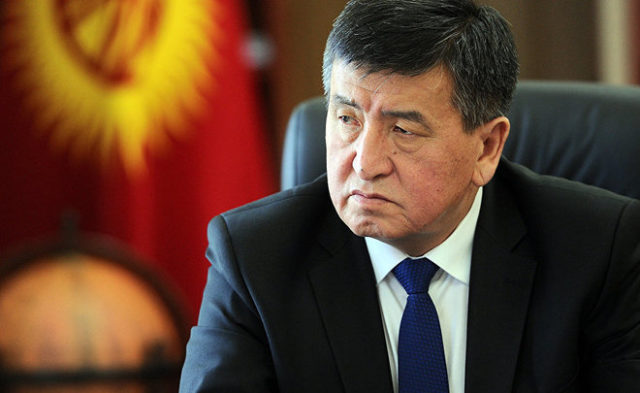
Kyrgyzstan’s Thorny Road: Sooronbay Zheenbayev Inherits Burdensome Legacy From His Predecessor
Publication: Eurasia Daily Monitor Volume: 14 Issue: 132
By:

Preliminary results of the presidential elections held in Kyrgyzstan, on October 15, announced by the Central Election Committee, may come as a surprise to observers who followed pre-election developments (see EDM, September 27). In a resounding victory, Sooronbay Zheenbekov, the ruling Social Democratic Party candidate, ended up winning 54.8 percent of the votes. His main opponent, the leader of the opposition party Respublika, Omurbek Babanov, garnered just over 33.8 percent. Babanov’s position seemed irreparably weakened after his more experienced political ally, Bakyt Torobayev, dropped out of the race on October 6. Contrary to apprehensions and fears of unrest and public disorder—common to all preceding presidential elections in Kyrgyzstan—the transfer of power this time occurred peacefully, notwithstanding a small protest gathering of around 600 people in the city of Talas, allegedly staged by Babanov’s supporters. Nevertheless, Babanov distanced himself from the organizers of the rally (For.kg, October 16).
Whatever the undercurrents of the election campaign, the presidents of each of the other Central Asian states as well as Russia will now have to deal with the loyal successor of Kyrgyzstan’s incumbent president, Almazbek Atambayev. The election had particularly strained Kazakhstan’s relations with Kyrgyzstan after Kazakhstani President Nursultan Nazarbayev met with Omurbek Babanov, in Almaty, last September (see EDM, September 27). Angered by this apparent signal of support for his rival, Zheenbekov accused Astana of trying “to thrust on Kyrgyzstan a foreign-backed puppet as a head of the state” (24.kg, October 13).
As the election campaign drew to a close, officials in Bishkek were further unnerved after Astana initiated entry restrictions at a checkpoint in Korday, on Kazakhstan’s side of the border, for Kyrgyzstani nationals and vehicles with Kyrgyz Republic license plates. This resulted in unprecedentedly long queues at the border, stretching for many kilometers. Similar alarming reports came from the Chon Kakpa, Ak Zhol and Ak Nyet checkpoints. Moreover, on October 10, Kazakhstan reportedly deployed military personnel to Korday. And pictures of Kazakhstani military trucks on the highway near this border village checkpoint appeared on social media. The National Security Committee of Kazakhstan issued a statement saying that the introduction of heightened security measures was necessary to ward off a potential terrorist threat and to control migration flows from Kyrgyzstan during the presidential election (Nws.tj, October 12).
However deep the tensions between Bishkek and Astana appeared on the eve of the election, the two neighboring nations nonetheless share a common faith and spiritual values as well as closely related languages. Both sides seem to understand they cannot afford to permanently alienate one another, particularly in economic and security terms. Shortly after his victory at the polls, Zheenbekov told Kazakhstani media he would continue to maintain good relations with Nazarbayev, “the president of the fraternal state” (Tengrinews.kz, October 16).
It is worth pointing out that last July, Kazakhstan signed an agreement to allocate $100 million to facilitate Kyrgyzstan’s integration into the Moscow-led Eurasian Economic Union (EEU) (Kt.kz, July 5). Additionally, according to Kazakhstani Prime Minister Bakytzhan Sagintayev, his country has invested $820 million into the economy of the Kyrgyz Republic. Apart from that, more than 125,000 Kyrgyzstani labor migrants are currently working in Kazakhstan (Ratel.kz, October 9). And especially pointedly, on October 15, large groups of Kyrgyz Republic servicemen arrived at the Iliyski military training range, in Kazakhstan, to take part in Nerushimoye Bratstvo 2017 (Unbreakable Fraternity 2017). This Collective Security Treaty Organization (CSTO) military exercise also included Armed Forces personnel from Armenia, Belarus, Russia, Kazakhstan and Tajikistan (Sputniknews.kz, October 15). Political scientist Azimbay Gali believes that, from a geopolitical perspective, it is reasonable for Kazakhstan to cement its ties with Kyrgyzstan in order to reduce militarily strong Uzbekistan’s influence in the region (Ktk.kz, October 16).
Of course, outgoing president Atambayev’s efforts to prioritize Kyrgyzstan’s economic and security interests in relations with Kazakhstan and Russia have not always been successful. He complained last December, that those two states were barring access to their markets for agricultural produce from Kyrgyzstan under the pretext that Kyrgyzstani exports fail to meet EEU standards (Eadaily.com, December 1, 2016). And the Kyrgyz Republic’s road to military cooperation with its CSTO partners is also full of stumbling blocks. On his visit to Russia last June, then-president Atambayev—doubting the capability of Tajikistan to put up effective resistance to potential militant infiltration from Afghanistan—asked Moscow to base Russian troops to guard the porous Kyrgyzstani-Tajikistani border in the vulnerable Batken region, rather than spend the resources to reinforce the Russian air base in Kant. But recently, Russian Deputy Foreign Minister Grigoriy Karasin bluntly dismissed appeals for a Russian border-security mission in Kyrgyzstan, retorting that Russia does not need an additional military base in this Central Asian republic (News-asia.ru, October 11).
In his election campaign platform, Sooranbay Zheenbekov vowed to complete economic reforms in Kyrgyzstan and to rebuild relations with EEU partners on an equal footing. But given the country’s ailing economy, rampant unemployment and uneasy relations with many of its neighbors, this will not be an easy task for the new president.



